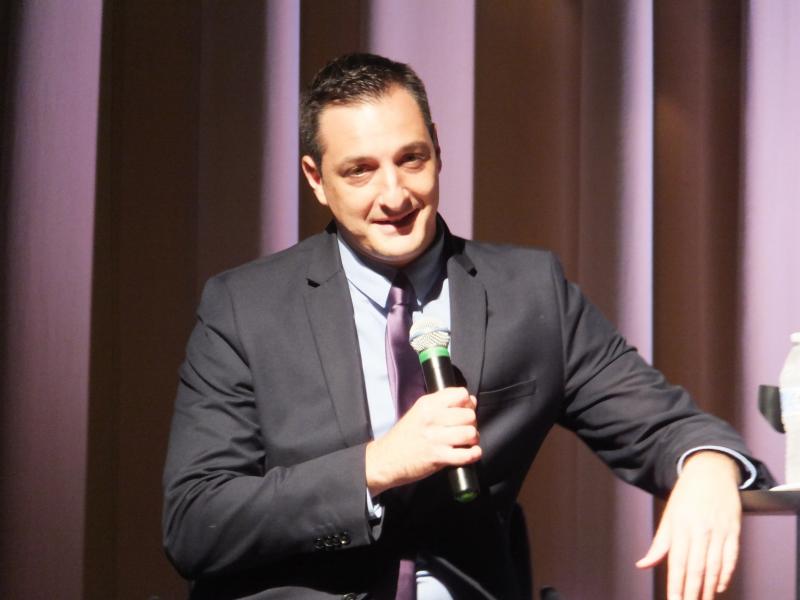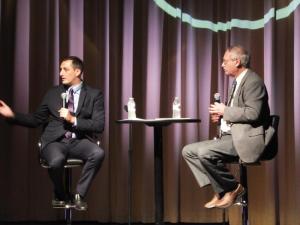NPR’s Montenaro returns to Delaware
For National Public Radio Politics Editor Domenico Montenaro, a visit to the Milton Theatre was a chance to return to familiar ground. A native of New York City, Montenaro attended University of Delaware, which means he’s spent his share of time at the beaches, passing through Milton on the way. “It’s always a beautiful town. It’s nice to see it’s being preserved and what they’re doing with this theater,” he said.
As part of the theatre’s guest speaker series, Montenaro discussed the media and political landscape in a conversation with Don Rush of Delmarva Public Radio.
The crowd was generally quiet, listening to the conversation, although there were some cheers when Montenaro mentioned polling showing President Donald Trump’s support dropping among women, and he drew a few scattered boos when he said he saw a bumper sticker reading “Back off” in large letters with “My President” underneath in smaller letters.
It’s all part of the difficult job facing journalists at high-profile outlets like NPR: delivering the news and the facts when the president himself is referring to journalists as enemies of the people, dismissing negative stories as “fake news,” and frequently getting caught making demonstrably false claims.
In response, Montenaro said NPR has ramped up its fact-checking, in part by consulting with political scientists to figure out ways to do fact-checking without reinforcing rumors or false claims. “You want to say to the audience, ‘Here’s this thing, don’t know if you heard about it.’ But political scientists say by doing that, you’re actually helping spread the rumor further. So we had to reverse engineer another way. You start with what the truth is and then back into it. There’s a lot of work we do to be airtight,” he said.
Montenaro said it’s important for news outlets to understand their audience. In the case of NPR, he said, the audience is generally well-educated and well-read. To better serve them, Montenaro said NPR has tried to lean into providing more context and analysis to the news. He said covering political figures like Trump is similar to sports in the sense that different coaches have different ways of working the referees: some are mild-mannered, while others like to scream and yell.
“Donald Trump’s a guy who I think we know what kind of style he would be if he were a coach on the court,” Montenaro said. “We just have to hunker down and do the work, and let the journalism show itself,” he said. “That’s a challenge, but I think we’re up for it.”
Having gotten his start covering campaigns, Montenaro said the big challenges for political reporters, especially embedded reporters on the campaign trail, is being tough on the subject while also maintaining relationships. Another challenge, he said, is separating the horse race aspect of a political campaign from the real effects of policy on the population.
“I think it’s really important to be conscious of that. I think that’s a question we ask ourselves on the desk each day. In our podcast, we will often talk about the elections but we always make a point now of saying, ‘Are we on the issues enough?’ I think that’s a first step. I agree there is too much horse race sometimes, but at the same time, they are campaigns,” he said.
Montenaro got into journalism at UD, having transferred there from Baruch College in Manhattan. He said he was seeking a school that offered, in his words, “green grass and frisbees” but also the concrete streets of New York. He had intended to be a business major in New York, but at UD, he started working for the student newspaper, The Review, and was hooked.
“I did a lot of sports reporting. I had played basketball in high school and always loved English. Then I wound up writing a couple of political things, covering the 2000 primary between Al Gore and Bill Bradley in Harlem. I found it fascinating,” Montenaro said.
The piece he wrote on that debate caught the eye of his journalism professor - praise, he said, that was a bit off-putting at first. “He thought it was the best thing I had written. I took offense because I’d written 300 sports articles and this one political thing, and he really liked it,” he said.
From there, he began working for the Asbury Park Press in Asbury Park, N.J. He left that job to spend three years teaching, but he missed reporting and got back into journalism working for CBS News. Montenaro moved to Washington, D.C., where he still lives, and began working with NBC News, where he learned the craft at the feet of two longtime hosts of the network’s “Meet The Press:” the late Tim Russert and the show’s current host, Chuck Todd. “Chuck Todd was my boss. I was his first hire there,” he said.
After seven years at NBC, he moved to PBS for a year and then to his new job at NPR. “NPR has such an awesome network of correspondents and reporters. They really do think of how to do things smartly. I’m very proud to work at a place that has such national and local reach,” Montenaro said.
He said he views himself as a hybrid, who does on-air spots while at the same time continuing to write as part of NPR’s online presence. He has trained in writing, editing, producing and being on-air. “I tried to make myself less fireable,” Montenaro joked of his many hats. “When NPR opened the job, they needed someone who could be in charge of the digital audience as well as being the lead political editor.”
With more and more people consuming their news online, Montenaro said social media poses its own challenge to journalism. With the massive amount of information out there, he said it is easy for people to form bubbles that confirm their own biases. “We don’t have a Walter Cronkite anymore, where there are only three or four sources of information that people believe are true. People have their own organizations they believe. When we don’t have a shared reality, that’s when society and democracy is most at risk,” Montenaro said.
Ryan Mavity covers Milton and the court system. He is married to Rachel Swick Mavity and has two kids, Alex and Jane. Ryan started with the Cape Gazette all the way back in February 2007, previously covering the City of Rehoboth Beach. A native of Easton, Md. and graduate of Towson University, Ryan enjoys watching the Baltimore Ravens, Washington Capitals and Baltimore Orioles in his spare time.





















































